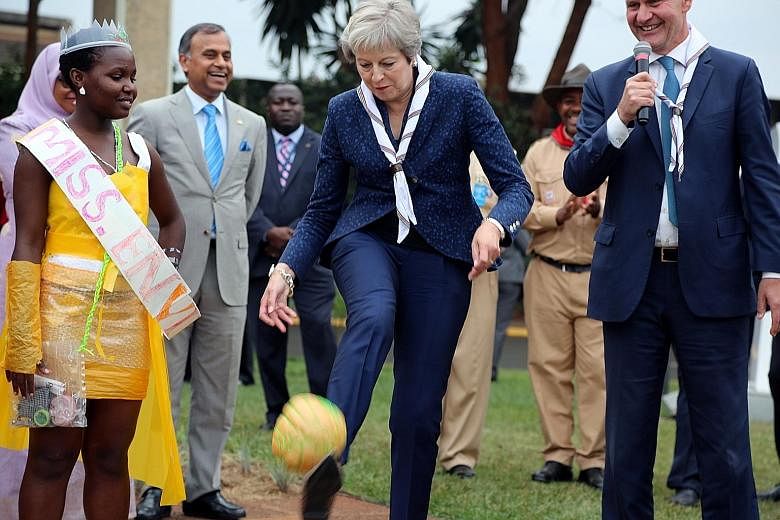LONDON • British Prime Minister Theresa May has said she would not allow compromises to her Brexit strategy that went against the national interest, seeking to allay fears among some in her Conservative Party that she will cave in to Brussels' demands in negotiations.
But her words drew scepticism, including from the former Brexit negotiator David Davis, who said the pledge was little reassurance and that he would vote against Parliament giving Mrs May's exit plan its required approval.
With under two months before Britain and the European Union want to agree a deal to end over 40 years of union, Mrs May is struggling to sell what she calls her business-friendly Brexit to her own party and across a divided country.
The EU, after its initial scepticism, is formulating its response to what has become known as the Chequers plan, which is designed to protect cross-border trade.
Then there are those at home who would baulk at further concessions even as an EU negotiator demands more concessions.
Difficult talks lie ahead for the British leader, followed by a vote in Parliament on whatever deal is reached. "I will not be pushed into accepting compromises on the Chequers proposals that are not in our national interest," Mrs May wrote in the Sunday Telegraph newspaper. Parliament returns from its summer break tomorrow.
Both Britain and the EU have stepped up contingency planning in case the two sides are unable reach a deal in time, setting financial markets on edge.
Mrs May also reiterated that she would not hold a second referendum on Britain's EU membership amid an increasingly vocal campaign for another public vote on the terms of the divorce. "To ask the question all over again would be a gross betrayal of our democracy," she said.
Mrs May's plan would keep Britain in a free-trade zone with the EU for manufactured and agricultural goods. But some Brexit supporters have said that would mean parts of the British economy would still be subject to Brussels' rules.
Mr Davis, who resigned in protest over the Chequers plan after two years as Mrs May's chief negotiator, told the BBC the proposal was "almost worse than being in" the EU, and that Mrs May could use "national interest" as a caveat to justify further concessions.
Trade Minister Liam Fox, who also campaigned for Brexit but still supports Mrs May, said it was now up to the EU to respond to the British proposal, when asked whether he thought further compromises would be necessary.
Any agreement Britain is able to strike with the EU will need approval from the British Parliament - presenting a major headache for Mrs May, who runs a minority government propped up by a deal with a small Northern Irish party and whose own Conservative Party is deeply divided over Brexit.
The Sunday Times reported that leading Brexiteer lawmakers in Mrs May's party are ready to publish their own plan for Brexit ahead of the Tories' annual conference beginning at the end of this month.
Meanwhile, lawmaker Nick Boles, who voted to remain in the EU in 2016, has launched a campaign to stop the Chequers plan and seek even closer ties.
REUTERS

